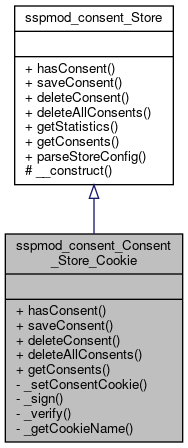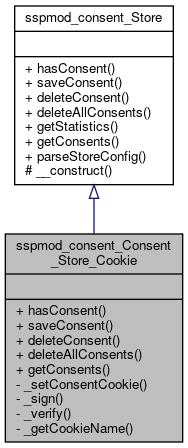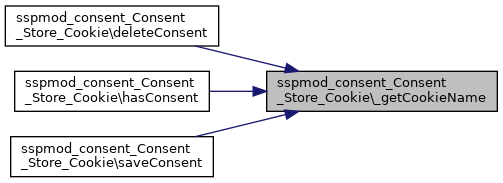 Inheritance diagram for sspmod_consent_Consent_Store_Cookie:
Inheritance diagram for sspmod_consent_Consent_Store_Cookie: Collaboration diagram for sspmod_consent_Consent_Store_Cookie:
Collaboration diagram for sspmod_consent_Consent_Store_Cookie:Public Member Functions | |
| hasConsent ($userId, $destinationId, $attributeSet) | |
| Check for consent. More... | |
| saveConsent ($userId, $destinationId, $attributeSet) | |
| Save consent. More... | |
| deleteConsent ($userId, $destinationId) | |
| Delete consent. More... | |
| deleteAllConsents ($userId) | |
| Delete consent. More... | |
| getConsents ($userId) | |
| Retrieve consents. More... | |
 Public Member Functions inherited from sspmod_consent_Store Public Member Functions inherited from sspmod_consent_Store | |
| hasConsent ($userId, $destinationId, $attributeSet) | |
| Check for consent. More... | |
| saveConsent ($userId, $destinationId, $attributeSet) | |
| Save consent. More... | |
| deleteConsent ($userId, $destinationId) | |
| Delete consent. More... | |
| deleteAllConsents ($userId) | |
| Delete all consents. More... | |
| getStatistics () | |
| Get statistics for all consent given in the consent store. More... | |
| getConsents ($userId) | |
| Retrieve consents. More... | |
Private Member Functions | |
| _setConsentCookie ($name, $value) | |
| Helper function for setting a cookie. More... | |
Static Private Member Functions | |
| static | _sign ($data) |
| Calculate a signature of some data. More... | |
| static | _verify ($signedData) |
| Verify signed data. More... | |
| static | _getCookieName ($userId, $destinationId) |
| Get cookie name. More... | |
Additional Inherited Members | |
 Static Public Member Functions inherited from sspmod_consent_Store Static Public Member Functions inherited from sspmod_consent_Store | |
| static | parseStoreConfig ($config) |
| Parse consent storage configuration. More... | |
 Protected Member Functions inherited from sspmod_consent_Store Protected Member Functions inherited from sspmod_consent_Store | |
| __construct (&$config) | |
| Constructor for the base class. More... | |
Detailed Description
Definition at line 21 of file Cookie.php.
Member Function Documentation
◆ _getCookieName()
|
staticprivate |
Get cookie name.
This function gets the cookie name for the given user & destination.
- Parameters
-
string $userId The hash identifying the user at an IdP. string $destinationId A string which identifies the destination.
- Returns
- string The cookie name
Definition at line 254 of file Cookie.php.
Referenced by deleteConsent(), hasConsent(), and saveConsent().
 Here is the caller graph for this function:
Here is the caller graph for this function:◆ _setConsentCookie()
|
private |
Helper function for setting a cookie.
- Parameters
-
string $name Name of the cookie. string | null $value Value of the cookie. Set this to null to delete the cookie.
- Returns
- void
Definition at line 271 of file Cookie.php.
References $globalConfig, $name, $params, SimpleSAML_Configuration\getInstance(), and SimpleSAML\Utils\HTTP\setCookie().
Referenced by deleteConsent(), and saveConsent().
 Here is the call graph for this function:
Here is the call graph for this function: Here is the caller graph for this function:
Here is the caller graph for this function:◆ _sign()
|
staticprivate |
Calculate a signature of some data.
This function calculates a signature of the data.
- Parameters
-
string $data The data which should be signed.
- Returns
- string The signed data.
Definition at line 204 of file Cookie.php.
References $data, and SimpleSAML\Utils\Config\getSecretSalt().
Referenced by _verify(), hasConsent(), and saveConsent().
 Here is the call graph for this function:
Here is the call graph for this function: Here is the caller graph for this function:
Here is the caller graph for this function:◆ _verify()
|
staticprivate |
Verify signed data.
This function verifies signed data.
- Parameters
-
string $signedData The data which is signed.
- Returns
- string|false The data, or false if the signature is invalid.
Definition at line 223 of file Cookie.php.
References $data, _sign(), and SimpleSAML\Logger\warning().
Referenced by getConsents().
 Here is the call graph for this function:
Here is the call graph for this function: Here is the caller graph for this function:
Here is the caller graph for this function:◆ deleteAllConsents()
| sspmod_consent_Consent_Store_Cookie::deleteAllConsents | ( | $userId | ) |
Delete consent.
- Parameters
-
string $userId The hash identifying the user at an IdP.
- Returns
- void This method does not return.
- Exceptions
-
Exception This method always throws an exception indicating that it is not possible to delete all given consents with this handler.
Reimplemented from sspmod_consent_Store.
Definition at line 137 of file Cookie.php.
◆ deleteConsent()
| sspmod_consent_Consent_Store_Cookie::deleteConsent | ( | $userId, | |
| $destinationId | |||
| ) |
Delete consent.
Called when a user revokes consent for a given destination.
- Parameters
-
string $userId The hash identifying the user at an IdP. string $destinationId A string which identifies the destination.
- Returns
- void
Reimplemented from sspmod_consent_Store.
Definition at line 117 of file Cookie.php.
References $name, _getCookieName(), and _setConsentCookie().
 Here is the call graph for this function:
Here is the call graph for this function:◆ getConsents()
| sspmod_consent_Consent_Store_Cookie::getConsents | ( | $userId | ) |
Retrieve consents.
This function should return a list of consents the user has saved.
- Parameters
-
string $userId The hash identifying the user at an IdP.
- Returns
- array Array of all destination ids the user has given consent for.
Reimplemented from sspmod_consent_Store.
Definition at line 156 of file Cookie.php.
References $_COOKIE, $destination, $name, $ret, _verify(), and SimpleSAML\Logger\warning().
 Here is the call graph for this function:
Here is the call graph for this function:◆ hasConsent()
| sspmod_consent_Consent_Store_Cookie::hasConsent | ( | $userId, | |
| $destinationId, | |||
| $attributeSet | |||
| ) |
Check for consent.
This function checks whether a given user has authorized the release of the attributes identified by $attributeSet from $source to $destination.
- Parameters
-
string $userId The hash identifying the user at an IdP. string $destinationId A string which identifies the destination. string $attributeSet A hash which identifies the attributes.
- Returns
- bool True if the user has given consent earlier, false if not (or on error).
Reimplemented from sspmod_consent_Store.
Definition at line 35 of file Cookie.php.
References $_COOKIE, $cookieName, $data, _getCookieName(), _sign(), SimpleSAML\Logger\debug(), and SimpleSAML\Logger\info().
 Here is the call graph for this function:
Here is the call graph for this function:◆ saveConsent()
| sspmod_consent_Consent_Store_Cookie::saveConsent | ( | $userId, | |
| $destinationId, | |||
| $attributeSet | |||
| ) |
Save consent.
Called when the user asks for the consent to be saved. If consent information for the given user and destination already exists, it should be overwritten.
- Parameters
-
string $userId The hash identifying the user at an IdP. string $destinationId A string which identifies the destination. string $attributeSet A hash which identifies the attributes.
- Returns
- void
Reimplemented from sspmod_consent_Store.
Definition at line 91 of file Cookie.php.
References $name, _getCookieName(), _setConsentCookie(), _sign(), and SimpleSAML\Logger\debug().
 Here is the call graph for this function:
Here is the call graph for this function:The documentation for this class was generated from the following file:
- libs/composer/vendor/simplesamlphp/simplesamlphp/modules/consent/lib/Consent/Store/Cookie.php













